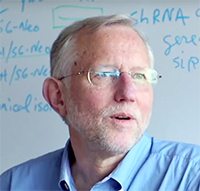2013 ALF Distinguished Scientific Achievement Award
Charles M. Rice, Ph.D., Leading Hepatitis C Virus Molecular Virologist, Receives American Liver Foundation’s 2013 Distinguished Scientific Achievement Award
 The American Liver Foundation has presented its 2013 Distinguished Scientific Achievement Award to Charles M. Rice, Ph.D., who is world-renowned in the field of hepatitis C research.
The American Liver Foundation has presented its 2013 Distinguished Scientific Achievement Award to Charles M. Rice, Ph.D., who is world-renowned in the field of hepatitis C research.
The award was presented to Dr. Rice by Tom Nealon, American Liver Foundation Chairman of the Board of Directors, on November 2 during The Liver Meeting 2013 hosted in Washington, DC by the American Association for the Study of Liver Diseases (AASLD).
The Distinguished Scientific Achievement Award is our most prestigious award honoring a scientist who has made a major contribution to liver disease research in basic science or in its application toward the prevention, treatment or cure of liver disease. It has been awarded 14 times since 1997.
Dr. Rice is the Maurice R. and Corinne P. Greenberg Professor in Virology and head of the Laboratory of Virology and Infectious Disease at The Rockefeller University in New York City. He also is the executive and scientific director of the Center for the Study of Hepatitis C, an interdisciplinary center established jointly by The Rockefeller University, New York-Presbyterian Hospital and Weill Cornell Medical College.
For the past 20-plus years since the discovery of hepatitis C virus (HCV), systems for unraveling the virus lifecycle and controlling HCV have evolved slowly. Recently, Dr. Rice and colleagues have developed primary cell culture systems and small animal models that finally allow virus-host interactions to be studied in vitro and in vivo.
This work is revealing a complex interplay between the virus and host innate immune responses that may limit virus spread, on the one hand, yet contribute to HCV’s remarkable ability to persist.
Recommended by the Prestigious Award’s First Recipient
Dr. Rice was recommended for the award by Francis V. Chisari, MD, a professor in the Department of Immunology and Microbial Science at The Scripps Research Institute in La Jolla, CA.
In recommending Dr. Rice for the award, Dr. Chisari, who was the first recipient of the American Liver Foundation’s Distinguished Scientific Achievement Award 16 years ago, said: “Charles Rice is widely acknowledged as the leading hepatitis C virus molecular virologist in the world. While others have also contributed much to our understanding of HCV, the collective weight of his contributions are unmatched by anyone else in this field. Because of his vision, insight, talent and generosity, he has propelled our understanding of HCV from the phenomenological to the atomic level, and he has laid the groundwork for the development and testing of vaccines and antiviral drugs for this disease.”
An Illustrious Career
Dr. Rice received his Ph.D. in biochemistry in 1981 from the California Institute of Technology, where he was also a postdoctoral research fellow from 1981 to 1985. Before he joined Rockefeller in 2000, he spent 14 years on the faculty of the Washington University School of Medicine.
Dr. Rice holds numerous U.S. and global patents related to hepatitis C virus molecular biology. He has published almost 300 original research publications in peer-reviewed journals as well as numerous review articles and book chapters.
Dr. Rice was elected to the National Academy of Sciences in 2005 in recognition of his accomplishments.
On November 30, 2012, it was announced that Dr. Rice had been given the Prize of Pathophysiology Professor Lucien Dautrebande from the Belgian Royal Academy of Medicine for his description of the molecular and cellular basis of hepatitis C infection in humans.
The prize is given every three years to an individual or team of researchers who have contributed to the progress of human or animal pathophysiology, with particular reference to advances in therapy. The Dautrebande Foundation noted that Dr. Rice’s research was vital to the development of anti-viral drugs for hepatitis C.
Facts About Hepatitis C
- At least 4 million Americans are infected with hepatitis C (HCV). Of those, more than 3 million have chronic HCV.
- Most people with HCV have no symptoms.
- HCV is spread by direct contact with infected blood.
- There is no vaccine to prevent HCV.
- Chronic HCV is the leading cause for adult liver transplantation in the U.S.
- For some patients, medications can help fight HCV. There is an ongoing search by pharmaceutical companies to discover new and more effective medications to treat HCV patients.
Last Updated on November 1, 2017
Share this page





